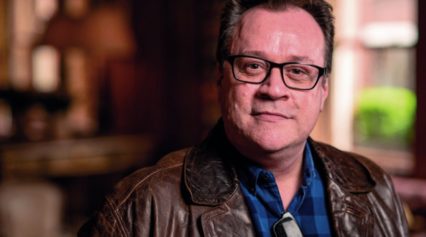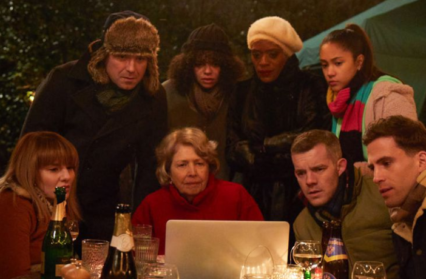Emily Garside looks at the work of Russell T Davies who with his latest TV drama, Years and Years, continues his efforts of placing homosexual lives in normative dramatic spaces, only this time it feels even more political.
This article contains spoilers.

Episode one of Russell T Davies’ Years and Years ends with Russell Tovey fucking a man as the world ends. That seems a flippant summary, but for gay men, sex has always been and still is, a political act. Seemingly apt from the writer who brought the world, Queer, as Folk and caused much clutching of pearls when gay characters showed up in his Doctor Who. However, the story of gay characters Daniel and Viktor in Years and Years is as much a political act as any of the broader politics of the story. And a gay man fucking an illegal immigrant as the world edges towards nuclear disaster is the opening gambit of one of the most important gay stories on television in recent years. Being gay is after all still a political act. Simply existing in the world becomes a political act. And that’s what insidiously the Viktor/Daniel storyline in Years and Years does.
‘People like us’ is the key line from Tovey’s character Daniel in Episode four. Daniel is a middle class, comfortably employed within the establishment (he works for the Council) gay man. He couldn’t be more ‘normal’ and ‘safe’. And worrying about his sexuality has been a relatively minor part of his life. In another part of the episode, his brother Stephen reminisces about being born in the 1980s, and how good life was for a while for their generation. And for gay men like Daniel it should have proven a ‘golden age’ to be gay – an age where marriage became legal, tolerance increased, rights were gained and society accepting. And for the most part, Davies paints that picture of the future – a time where gay marriage is normalised, and prejudice seems limited. At least in the middle-class bubble of the Lyons family. They’re painted as liberals accepting of one niece potentially having a girlfriend, being trans and a nephew wearing a dress.
It seems then the future for gay people is one aspect of Russell T Davies’ dystopian vision that isn’t as bad. In one way it’s almost victorious. Davies has for years worked on ‘normalising’ gay people on television. In an interview with New Statesman in 2016, he commented on this saying, ‘Whatever I worked on, I put a gay character in. I put a lesbian vicar into a show. I put gay teenagers into Children’s Ward.’ And of course, Doctor Who under Davies’ tenure had gay characters peppered across time and space which allowed Davies to imagine various futures and civilisations where gay and trans people were just accepted. Initially, Years and Years might seem like a ‘real world’ version of this.
The only time anyone goes out of the way to comment on it, was when Grandmother Muriel comments ‘I’m not prejudiced…I don’t like people who wear sunglasses indoors’ (A line Davies admitted on his Instagram was stolen from a 1970s episode of Coronation Street). The near future then seems to be enlightened in regards to sexuality if nothing else. But being gay in Davies’ world remains a political act, both within the world and as a televisual statement.
The introduction of Viktor, a Ukrainian asylum seeker, disrupts Daniel Lyons’ comfortable view of being gay. On first meeting, Viktor tells Daniel of being tortured in his own country, and of being turned in by his own parents. Within the narrative and for viewers it’s a stark reminder of the closeness of persecution for being gay, and the intolerance that is a contrast to the comfortable world of the Lyons family. And this is not actually some dystopian future, as with much of Davies’ story, it’s happening now, except many people are choosing not to see it. When a lesbian couple are attacked in England, we have reminded persecution of homosexuals is not something that just happens abroad, and yet we deport people to countries where because of their sexuality they await imprisonment, even death.

At first, it seems Years and Years may escape the trope of a tragic gay story. Viktor is deported, but escapes to a tolerant Spain, a kind of ‘up yours’ to a Britain falling apart. As Daniel and Viktor struggle to get home to Britain through increasingly desperate measures, they become refugees, the kind of people that Daniel has watched on the news, crammed into tiny boats crossing the channel. And as with many of those stories, it ends in tragedy. ‘It doesn’t happen to people like us,’ thinks Daniel, sure in his comfortable status. And yet it is his lifeless body washed up on a beach.
It’s hard to explain perhaps to someone, not from the LGBTQ+ community just what a chilling streak of recognition episode four of Years and Years brought out. The sense of fear, tightness in the chest watching the chase across Europe, that all-too-familiar feeling of ‘will we be noticed’. Their attempt to escape across Europe is also a neat metaphor- they’re hiding, seconds away from being ‘discovered’ and encountering the terrifying consequences. It’s a gay tale as old as time. The sight of Tovey’s lifeless body on the beach. Hearing Viktor recount the loss of his lover to a family that is not his, and the fear of now being rejected by them that hangs in the air.
Davies is invoking the words and spirit of generations past. As activist and playwright Larry Kramer said when he told a gathering of New York’s gay community in 1987, ‘If my speech tonight doesn’t scare the shit out of you, we’re in real trouble. If what you’re hearing doesn’t rouse you to anger, fury, rage, and action, gay men will have no future here on earth.’ Kramer quickly realised that his talent for writing was his way into that fight, and through his play, The Normal Heart reached more in the way of activism than arguably anything else he did. It feels like Davies is channelling Kramer and all the activists of the 70s and 80s who fought a fight long before complacency was remotely possible. Kramer and others like Tony Kushner and Kevin Elyot wrote their activism through entertainment. For them it was the theatre, for Davies it has always been the power of television. Davies is using, instead of the podium and a march, a television screen. Reaching into living rooms, where comfortable life might have blinded many to the fight that still goes on, and again it feels like he is through confronting people with these scenes, echoing Kramer once again. He’s asking, as Kramer did; ‘How long does it take before you get angry and fight back?’
Having sex in the face of an apocalypse might be a political statement. But so for gay people, is being in love. Davies reminds us of that in true tragic form. And it’s a rallying cry both to politics, and to love.
Years and Years is available now on the BBC iPlayer.
Emily Garside is a regular contributor to Wales Arts Review and often explores exciting BBC dramas.











